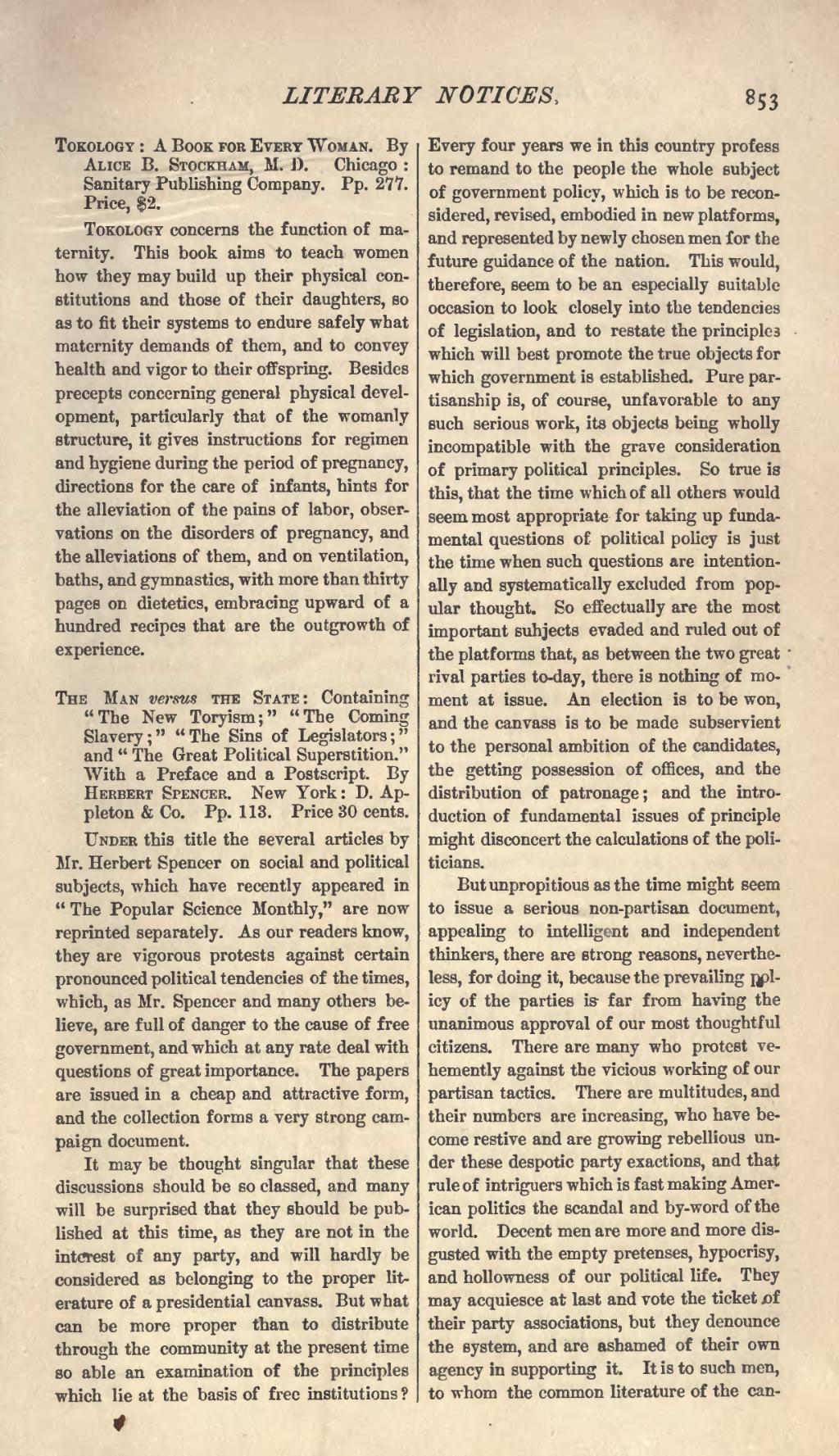Tokology: A Book for Every Woman. By Alice B. Stockham, M. D. Chicago: Sanitary Publishing Company. Pp. 277. Price, $2.
Tokology concerns the function of maternity. This book aims to teach women how they may build up their physical constitutions and those of their daughters, so as to fit their systems to endure safely what maternity demands of them, and to convey health and vigor to their offspring. Besides precepts concerning general physical development, particularly that of the womanly structure, it gives instructions for regimen and hygiene during the period of pregnancy, directions for the care of infants, hints for the alleviation of the pains of labor, observations on the disorders of pregnancy, and the alleviations of them, and on ventilation, baths, and gymnastics, with more than thirty pages on dietetics, embracing upward of a hundred recipes that are the outgrowth of experience.
The Man versus the State: Containing "The New Toryism;" "The Coming Slavery;" "The Sins of Legislators;" and "The Great Political Superstition." With a Preface and a Postscript. By Herbert Spencer. New York: D. Appleton & Co. Pp. 113. Price 30 cents.
Under this title the several articles by Mr. Herbert Spencer on social and political subjects, which have recently appeared in "The Popular Science Monthly," are now reprinted separately. As our readers know, they are vigorous protests against certain pronounced political tendencies of the times, which, as Mr. Spencer and many others believe, are full of danger to the cause of free government, and which at any rate deal with questions of great importance. The papers are issued in a cheap and attractive form, and the collection forms a very strong campaign document.
It may be thought singular that these discussions should be so classed, and many will be surprised that they should be published at this time, as they are not in the interest of any party, and will hardly be considered as belonging to the proper literature of a presidential canvass. But what can be more proper than to distribute through the community at the present time so able an examination of the principles which lie at the basis of free institutions?
Every four years we in this country profess to remand to the people the whole subject of government policy, which is to be reconsidered, revised, embodied in new platforms, and represented by newly chosen men for the future guidance of the nation. This would, therefore, seem to be an especially suitable occasion to look closely into the tendencies of legislation, and to restate the principles which will best promote the true objects for which government is established. Pure partisanship is, of course, unfavorable to any such serious work, its objects being wholly incompatible with the grave consideration of primary political principles. So true is this, that the time which of all others would seem most appropriate for taking up fundamental questions of political policy is just the time when such questions are intentionally and systematically excluded from popular thought. So effectually are the most important subjects evaded and ruled out of the platforms that, as between the two great rival parties to-day, there is nothing of moment at issue. An election is to be won, and the canvass is to be made subservient to the personal ambition of the candidates, the getting possession of offices, and the distribution of patronage; and the introduction of fundamental issues of principle might disconcert the calculations of the politicians.
But unpropitious as the time might seem to issue a serious non-partisan document, appealing to intelligent and independent thinkers, there are strong reasons, nevertheless, for doing it, because the prevailing policy of the parties is far from having the unanimous approval of our most thoughtful citizens. There are many who protest vehemently against the vicious working of our partisan tactics. There are multitudes, and their numbers are increasing, who have become restive and are growing rebellious under these despotic party exactions, and that rule of intriguers which is fast making American politics the scandal and by-word of the world. Decent men are more and more disgusted with the empty pretenses, hypocrisy, and hollowness of our political life. They may acquiesce at last and vote the ticket of their party associations, but they denounce the system, and are ashamed of their own agency in supporting it. It is to such men, to whom the common literature of the can-

